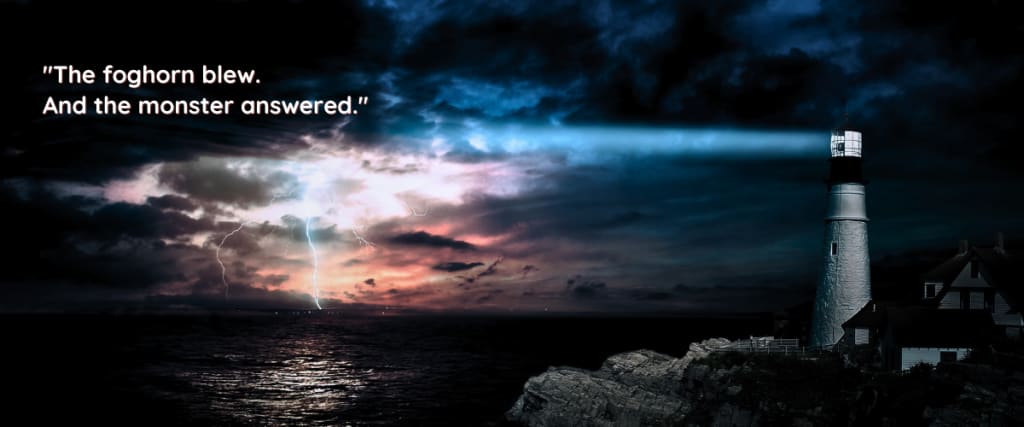The Short Story That Changed Me Irrevocably
"The Foghorn" by Ray Bradbury

One of my favorite stories of all time is The Foghorn, a short story written by Ray Bradbury.
Summary
Bradbury's sea monster, perhaps the last of its kind, inhabits the depths of the ocean surfacing only to respond to the nostalgic call of the foghorn. It cries out in futility, trying to communicate with the foghorn which it has mistaken for another of its kind. Eventually, perhaps disappointed, the monster sinks back down into the deep and swims away all alone.
Excerpt:
"But why does it come here?"
The next moment I had my answer.
The Fog Horn blew.
And the monster answered.
A cry came across a million years of water and mist. A cry so anguished and alone it shuddered in my head and my body. The monster cried out at the tower. The Fog Horn blew. The monster roared again. The Fog Horn blew. The monster opened its great toothed mouth and the sound that came from it was the sound of the Fog Horn itself. Lonely and vast and far away. The sound of isolation, a viewless sea, a cold night, apartness. That was the sound.
"Now," whispered McDunn, "do you know why it comes here?"
I nodded.
"All year long, Johnny, that poor monster there lying far out, a thousand miles at sea, and twenty miles deep maybe, biding its time, perhaps a million years old, this one creature. Think of it, waiting a million years; could you wait that long? Maybe it's the last of its kind. I sort of think that's true. Anyway, here come men on land and build this lighthouse, five years ago. And set up their Fog Horn and sound it and sound it out towards the place where you bury yourself in sleep and sea memories of a world where there were thousands like yourself, but now you're alone, all alone in a world that's not made for you, a world where you have to hide.
"But the sound of the Fog Horn comes and goes, comes and goes, and you stir from the muddy bottom of the Deeps, and your eyes open like the lenses of two-foot cameras and you move, slow, slow, for you have the ocean sea on your shoulders, heavy. But that Fog Horn comes through a thousand miles of water, faint and familiar, and the furnace in your belly stokes up, and you begin to rise, slow, slow. You feed yourself on minnows, on rivers of jellyfish, and you rise slow through the autumn months, through September when the fogs started, through October with more fog and the horn still calling you on, and then, late in November, after pressurizing yourself day by day, a few feet higher every hour, you are near the surface and still alive. You've got to go slow; if you surfaced all at once you'd explode. So it takes you all of three months to surface, and then a number of days to swim through the cold waters to the lighthouse. And there you are, out there, in the night, Johnny, the biggest damned monster in creation. And here's the lighthouse calling to you, with a long neck like your neck sticking way up out of the water, and a body like your body, and most important of all, a voice like your voice. Do you understand now, Johnny, do you understand?"
The Fog Horn blew.
The monster answered.
~ Ray Bradbury
I really love the way Ray Bradbury characterized the ocean as an intimidating and mysterious force to be reckoned with and how the deep sea brings forth monsters.
I love that the story is set at night. There is something about nighttime that amplifies the sense of isolation and sadness evoked by the story.
I’ve always thought of The Foghorn as purely science fiction because of the scientific bent, but now that I think about it, there is a hint of Lovecraftian horror to this tale--monster from the deep and all.
The Foghorn is the story that inspired me to start writing science fiction.
When I first read this story, it took my breath away.
I remember thinking. My god, was it really possible to put that into words?
That desperate and endless yearning.
I realized around that time that I’d found in writers like Bradbury, McCaffrey, Asimov and Niven, kindred spirits of some kind.
As I mentioned in my post, The Quiet One, I then started dreaming of writing a story, the likes of which have never been told. A story that would let some other kid realize that there was nothing under the sun or beyond, that couldn’t be put into words.
To this day, I love imagining strange worlds and the people who inhabit them.
Science fiction, in general, appeals to me because it allows us to dwell in possibilities where science is concerned.
As a child, I found it maddening, not being able to wrap my head around how an entire universe could have originated from nothing. As an adult, even while knowing about stuff like Planck time, superclusters, filaments, and collapsing higher dimensional stars, I’m still mystified by the Big Bang Theory.
I’ve long since discovered, though, that imagining is far more entertaining than knowing.
Work Cited:
Bradbury, Ray. The Foghorn. 1951. https://archive.org/stream/TheFogHorn/TheFogHorn.txt
About the Creator
Tonya R. Moore
Jamaican writer & editor. Half-baked poet.
I write about dark stuff and star stuff.






Comments
There are no comments for this story
Be the first to respond and start the conversation.